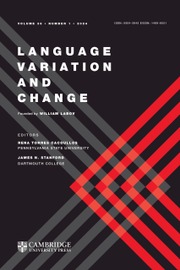Article contents
New -way(s) with -ward(s): lexicalization, splitting and sociolinguistic patterns
Published online by Cambridge University Press: 27 July 2020
Abstract
This paper investigates the distribution of a morphological variable that has not gained much attention in the literature: adverbial -s versus -Ø. This morpheme predominantly occurs with adverbs ending in -ward(s), like forward(s), afterward(s), and inward(s), or -way(s), such as anyway(s) or halfway(s). Using a large database of sociolinguistic interviews of Ontario English and an apparent-time perspective, we show that the use of the variants changes over the twentieth century, with the adverbial suffixes -ward(s) and -way(s) behaving differently. -Ward(s) shows a trend towards -s, while most words in -way(s) increasingly take -Ø–splitting by adverbial suffix. Anyway(s) is an exception to this pattern, with a change from below towards -s, strongly conditioned by social standing. We also find evidence for lexicalization of forms without -s in phrasal verbs like to move forward. We explain these findings against the background of variationist sociolinguistic theory and principles of language change.
- Type
- Research Article
- Information
- Copyright
- Copyright © The Author(s), 2020. Published by Cambridge University Press
Footnotes
The second author gratefully acknowledges the Social Sciences and Humanities Research Council of Canada (SSHRC) for research grants 2001-present and the Canada Research Chairs program (CRC) in Language Variation and Change. We are indebted to the many fieldworkers and employees of the UofT Variationist Sociolinguistics Lab. We are grateful to the following scholars and sources for some of the data used in this work: Rebecca Roeder for the Thunder Bay data; Graeme Gordon and Kaye Rogers for the Tay Valley data; Professor Emeritus Ian Pringle (Carleton University) for the Lanark County data, from the 1975–1980 Linguistic Survey of the Ottawa Valley; John MacFie and the Parry Sound District Historical Society for the Parry Sound data; the Hastings County Historical Society for the 1975 Belleville Oral History Project Archive; the Museum of Northern History for the Kirkland Lake 1983 data; the Cobalt Mining Museum for the 1990 Cobalt data.
References
REFERENCES
- 1
- Cited by



